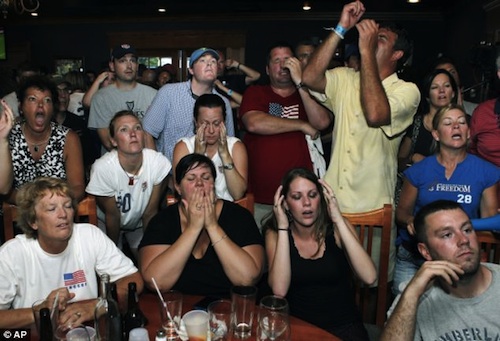I’d like to say this is a sign that I’m older and more mature, but it’s probably not: I haven’t watched a lot of this World Cup in bars. Most of it has been in my living room, with the round of 16 and eight mostly happening as I pack up my apartment. Still, I’ve watched a ton of memorable sporting events in bars — probably too many to count — and I generally know how the flow of a bar goes during dramatic ebbs and flows in a given contest. I watched a bunch of 2002, 2006 and 2010 World Cup games at bars, too, so I’m familiar with the ethos and atmosphere of a pub during a penalty kick situation: silence, perhaps punctuated by a little context (“He’s gotta make this to keep them even!”), and then … reaction. Good, bad, ugly, etc. Something will happen. People will scream, jump, cry, gasp, etc.
You’ll often hear the argument that Twitter is, essentially, a large digital sports bar with people lobbing opinions out into the ether (as happens in a lot of bars). Well, now there’s conclusive proof of this.
Look at the chart below. It’s from Twitter data — they’ve ton an excellent job with data analysis during this World Cup, although I have no idea if that means they’re a more valuable brand now — and looks at the Brazil-Chile shootout (one of two so far, I believe, with the other being Netherlands-Costa Rica). The popped out portion is David Luiz (Brazil’s first shooter). Look at what happens:
See that jump? That’s the same situation as in an actual bar. Silence — > shot taken — > massive reaction. As Twitter’s blog puts it:
On Twitter, you can see the world gradually draw its attention more to the screen as the shot nears. When the referee blows the whistle, Twitter goes nearly silent as all eyes are glued on the crucial kick. The shot is taken, and Twitter — as with fans worldwide — erupts into applause, disappointment and elation.
On surface, this isn’t that interesting. Essentially what we’re discussing is the idea that something dramatic happens on a TV, so people turn away from one screen (phone/tablet/laptop) and towards another (television). Once the thing has happened, people go back to the screen where they can provide their pithy two cents on everything. That’s the modern world, right? You see that happen with the World Cup, but also with Scandal. But in the case of Twitter and the World Cup, it’s a bit more interesting because people have been making this “… Twitter is a sports bar …” reference for years, and, well, here’s some evidence that in form and function, it really is.

